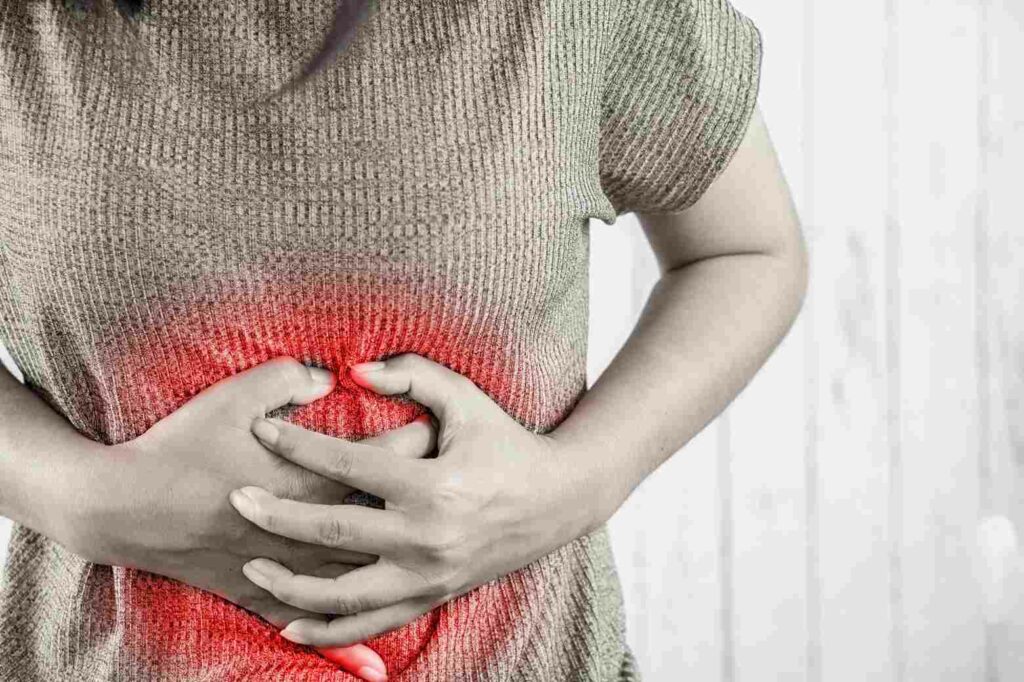Anxiety is a mental disorder that is characterized by excessive worry and fear. It can be accompanied by physical symptoms, such as stomach pain. In this blog post, we will explore the connection between anxiety and stomach pain. We will discuss the different ways that these two conditions can interact with each other and cause problems for those who suffer from them. If you are struggling with both anxiety and stomach pain, read on for helpful tips on how to manage your symptoms!
Contents
Defining Anxiety
 Anxiety is a normal emotion that we all feel at one time or another. It’s what we feel when we’re worried, nervous, or scared about something. Everyone experiences anxiety differently, but some common symptoms include feeling tense, restless, and on edge.
Anxiety is a normal emotion that we all feel at one time or another. It’s what we feel when we’re worried, nervous, or scared about something. Everyone experiences anxiety differently, but some common symptoms include feeling tense, restless, and on edge.
Moreover, this condition is defined as a serious mental disorder that requires treatment. When a person has an anxiety disorder, the feeling of anxiety is so strong and persistent that it interferes with their daily life.
Anxiety disorders are the most common mental health problem in the United States, affecting 40 million adults every year. That’s about 18% of the population! And yet, only 36.% of people with anxiety disorders receive treatment. Some of the common types of anxiety disorders include:
- Generalized Anxiety Disorder (GAD)
- Panic Disorder
- Social Anxiety Disorder (SAD)
- Obsessive-Compulsive Disorder (OCD)
- Posttraumatic Stress Disorder (PTSD)
So, what does all of this have to do with stomach pain? Let’s take a closer look.
Understanding Anxiety Stomach Pain
Anxiety and stomach pain is actually very common experience. It’s estimated that as many as one in four people experiences some form of it at any given time. This is very common and can be caused by a number of different things.
There are two main types of anxiety that can lead to stomach pain: physical and psychological. Physical anxiety is the kind that comes from an underlying medical condition, such as irritable bowel syndrome (IBS). Psychological anxiety is the kind that’s brought on by stress, worry, or other mental health issues.
There are a few different ways that anxiety can cause stomach pain. For one, it can lead to muscle tension. This can cause the muscles in your stomach to cramp up and spasm, which leads to pain. Anxiety can also cause changes in your digestive system motility, which is the speed at which food and liquids move through your digestive system. When motility is slowed down, it can cause gas, bloating, and pain.
If you’re experiencing anxiety and stomach pain, there are a few things you can do to ease the discomfort. You just need to find the right method for you. For some people, some self-help strategies can be really helpful. But, if your anxiety is severe, you may need to see a mental health professional for treatment.
How Anxiety Causes Stomach Pain?
 As we are all aware, the mind and body are interconnected. This means that if you are experiencing anxiety, it can manifest in physical symptoms. One of these physical symptoms is stomach pain.
As we are all aware, the mind and body are interconnected. This means that if you are experiencing anxiety, it can manifest in physical symptoms. One of these physical symptoms is stomach pain.
There are a few different ways that anxiety can lead to stomach pain. First, when we experience anxiety, our bodies go into “fight or flight” mode. This means that the body is preparing for a stressor, even if there isn’t one. This can lead to an increase in stomach acid, which can cause pain and discomfort.
Another way that anxiety can cause stomach pain is through muscle tension. When we are anxious, our muscles tense up in order to protect us from whatever perceived danger we are facing. This tension can lead to cramping and pain in the stomach area.
Lastly, anxiety can also cause gastrointestinal issues. When we are anxious, our digestive system slows down. This can lead to constipation, diarrhea, or even nausea and vomiting.
So, when someone is suffering from any mental disorders, there are high chances that they will also experience some form of stomach pain. Hence, if you are experiencing stomach pain, it is important to check in with your mental health as well.
What Is The Connection Between Anxiety And Stomach Pain?
The connection between anxiety and stomach pain is not always clear. However, it is believed that anxiety and stomach pain are closely related because of the mind-body connection. This means that the brain and the gut are connected and can influence each other.
For example, when someone is feeling anxious, they may experience stomach pain. This is because anxiety can cause changes in the digestive system, including increased acid production and muscle tension. These changes can lead to stomach pain.
Conversely, stomach pain can also cause anxiety. This is because the pain can be a source of stress and worry. It can also trigger memories of past experiences of pain or other negative emotions.
So, the connection between anxiety and stomach pain is bidirectional. This means that one can cause the other, and vice versa.
Examples of anxiety and stomach issues
There are many different examples of how anxiety and stomach issues can be connected. Here are a few:
- Abdominal tension: This is when the muscles in the stomach area become tight. This can happen when someone is feeling anxious or stressed.
- Acid reflux: This is when stomach acid flows back up into the esophagus. It usually happens when someone is lying down or after eating.
- Chronic stomach pain: It is when stomach pain lasts for a long period of time. It can be caused by anxiety, stress, or other medical conditions.
- Irritable bowel syndrome (IBS): This is a condition that affects the digestive system. IBS is often associated with anxiety and stress.
Anxiety and stomach pain can both be very debilitating. They can cause a lot of physical and emotional distress. If you are experiencing either of these, it is important to seek help from a healthcare professional.
How To Identify If It’s Just Anxiety Stomach Pain And Not Ulcer?
 It is often hard to tell if the stomach pain is caused by anxiety or an ulcer. However, there are a few key differences between the two that can help you determine what is causing your discomfort. If the pain is:
It is often hard to tell if the stomach pain is caused by anxiety or an ulcer. However, there are a few key differences between the two that can help you determine what is causing your discomfort. If the pain is:
- Localized in one area
- Worsened by eating or drinking
- Relieved by antacids
If all this sounds familiar, it’s likely that you’re experiencing anxiety and stomach pain. This is caused by the build-up of stress in the gut, which can lead to cramping, bloating, and nausea. The good news is that this type of pain is not serious and can be relieved with some simple lifestyle changes.
On the other hand, an ulcer is a break in the lining of the stomach or small intestine. This can be caused by a bacterial infection, overuse of pain relievers, or other underlying health conditions. Ulcer pain is usually:
- Burning or gnawing
- Not relieved by antacids
- Acidic or sour taste in the mouth
However, a proper diagnosis is always necessary to rule out other potential causes of stomach pain. If you’re experiencing any of the above symptoms, be sure to see your doctor as soon as possible.
How To Deal With Anxiety Stomach Pain?
There are a few things you can do to help ease the stomach pain caused by anxiety. Some of these tips are as follows:
Identify the triggers
If you know what situations or activities trigger your anxiety, you can try to avoid them. If that’s not possible, try to be prepared for them mentally and emotionally. More often triggers are things like public speaking or social gatherings. However, stomach pain in anxiety can be caused by more mundane things such as work deadlines or family conflicts.
Moreover, when you’re feeling anxious, your body is in a “fight or flight” mode. This means that your digestive system slows down because blood is redirected to your muscles and brain. When this happens, the food in your stomach can start to ferment and produce gas, which leads to bloating and pain.
Learn relaxation techniques
 There are a number of different relaxation techniques that can be effective in managing anxiety and stomach pain. These include things like:
There are a number of different relaxation techniques that can be effective in managing anxiety and stomach pain. These include things like:
- Deep breathing
- Progressive muscle relaxation
- Meditation
- Guided imagery
- Visualization
These techniques are all based on the premise of helping you to focus your attention on something other than your pain or anxiety. By doing this, you can help to ease both conditions. It’s important to find a relaxation technique that works for you and that you’re comfortable with. Some people find one technique more effective than others.
Get regular exercise
Exercise is a great way to reduce stress and promote overall health. It can also be helpful in managing anxiety and stomach pain. Even moderate exercise can help to reduce symptoms. Also, getting exercise simply means that one should stay active for at least 30 minutes most days of the week.
There are a few different ways to get regular exercise, such as:
- joining a sports team,
- going to the gym, or
- taking up a new hobby that gets you moving.
No matter how you do it, regular exercise is key to managing your overall health and well-being.
Choose healthy diet
Diet is a vital role in human health, and it is one of the most important factors which affect our physical and mental condition. So if you are suffering from anxiety and stomach pain, you should think about your diet first. A healthy diet not only can improve your physical condition but also can reduce your anxiety and stress levels.
There are many different types of diets that can help you reduce anxiety and stomach pain, but the best one is the Mediterranean diet. This diet is rich in healthy fats, vegetables, and fruits which can improve your overall health and reduce stress levels. So if you want to reduce anxiety and stomach pain, you should try the Mediterranean diet.
Get enough sleep
 Sleep is really important when it comes to mental health. Not getting enough sleep can make anxiety worse. Try to stick to a regular sleep schedule. Go to bed and wake up at the same time every day, even on weekends. This will help your body get into a good sleep rhythm.
Sleep is really important when it comes to mental health. Not getting enough sleep can make anxiety worse. Try to stick to a regular sleep schedule. Go to bed and wake up at the same time every day, even on weekends. This will help your body get into a good sleep rhythm.
And avoid caffeine before bed. The stimulating effects of caffeine can make it hard to fall asleep. So cut back on coffee, tea, and energy drinks in the late afternoon and evening. Nicotine is also a stimulant, so avoid smoking before bed.
Practice journals
This is something that can help you to get all of the thoughts out of your head, and it can also serve as a distraction from the pain. It can be really cathartic to just write everything down, and it can help to lessen the anxiety and the stomach pain.
Moreover, there are various techniques of diaphragmatic breathing that can help to ease the pain and the anxiety. This is a type of breathing that ensures that your stomach expands when you breathe in, and it can help to relax the muscles and ease the pain.
Keep your mind occupied
It is the little things that can trigger anxiety and set off a stomach ache. To avoid this, keep your mind occupied with positive thoughts or activities. This will help to prevent you from fixating on the pain and making it worse. In addition, there are a number of relaxation techniques that can help to ease anxiety and stomach pain.
Some people find that listening to calm music or reading can help to relax their mind and body. Others may prefer to meditate or do yoga. If you are struggling to manage your anxiety, it is important to speak to a doctor or mental health professional.
Seek professional help
 If you have anxiety and stomach pain that’s disrupting your life, it’s important to seek professional help. A therapist can help you understand and manage your anxiety, which may be helpful in reducing your stomach pain. In some cases, medication may also be necessary. If you’re struggling to cope with anxiety and stomach pain, don’t hesitate to reach out for help.
If you have anxiety and stomach pain that’s disrupting your life, it’s important to seek professional help. A therapist can help you understand and manage your anxiety, which may be helpful in reducing your stomach pain. In some cases, medication may also be necessary. If you’re struggling to cope with anxiety and stomach pain, don’t hesitate to reach out for help.
There are several types of therapies that can be helpful for anxiety, including cognitive-behavioral therapy (CBT), exposure therapy, and relaxation techniques. A therapist can help you identify which type of therapy may be best for you based on your individual needs.
So, overall there are numerous ways to address anxiety and stomach pain. If you’re struggling with both, reach out to a professional for help in finding the best way to manage your symptoms. Also, be sure to stay calm and positive because it can help you feel better overall and may even reduce your stomach pain.
Conclusion
Conclusively, anxiety and stomach pain are real things. If you experience it, you’re not alone. While the condition can be frustrating and cause a great deal of discomfort, there are treatments available that can help. Moreover, understanding the connection between anxiety and stomach pain can be empowering. If you know that your stomach pain is caused by anxiety, you can take steps to manage your anxiety and reduce your stomach pain.
For more information, please contact MantraCare. Anxiety is a common mental health condition characterized by persistent feelings of worry, fear, and apprehension. If you have any queries regarding Online Anxiety Counseling experienced therapists at MantraCare can help: Book a trial Anxiety therapy session


